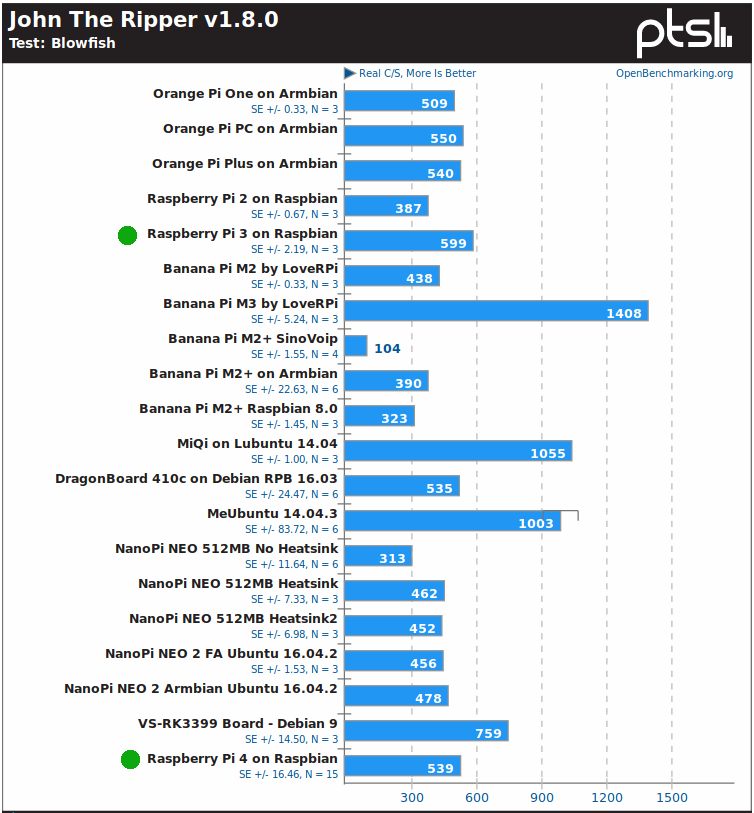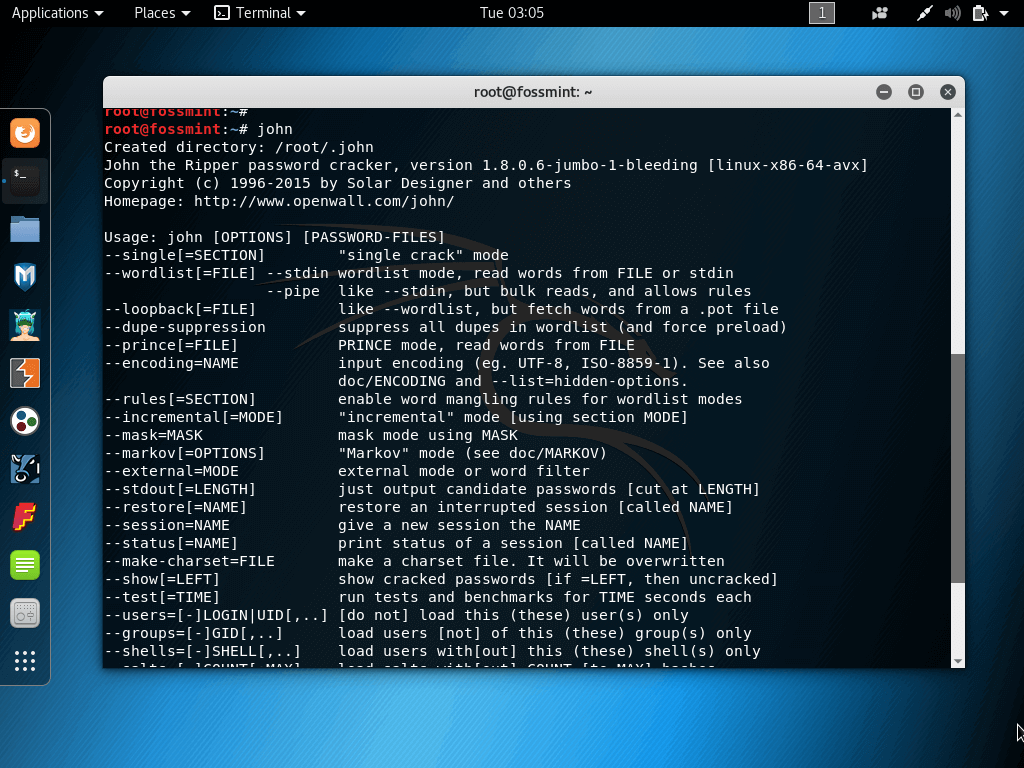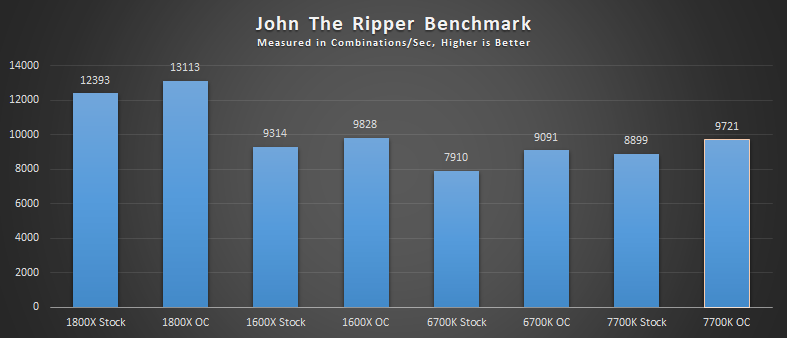- John The Ripper Multi Core Competencies
- John The Ripper Multi Core Bits
- John The Ripper Multi Core I7
- Free Download John The Ripper
- John The Ripper Online
- John Ripper Download
This is the community-enhanced, 'jumbo' version of John the Ripper.It has a lot of code, documentation, and data contributed by jumbodevelopers and the user community. It is easy for new code to be addedto jumbo, and the quality requirements are low, although lately we’vestarted subjecting all contributions to quite some automated testing.This means that you get a lot of functionality that is not necessarily'mature', which in turn means that bugs in this code are to be expected.
John the Ripper homepage is:
If you have any comments on this release or on JtR in general, pleasejoin the john-users mailing list and post in there:
For contributions to John the Ripper jumbo, please use pull requests onGitHub:
You can pipe an output of JTR into Aircrack, See -stdout and/or -incremental on the JTR wiki Benchmark This Benchmark was done using the same 2.5 GHz Dual Core, using 3 different build of John The Ripper, each time Single/Dual Core mode, the test was 5 sec for a Raw SHA1 hash. . Automatically takes advantage of all cores/cpus (great for multi-core systems). Has “rules” that are semi-compatible with John the Ripper. Under constant development. Very active IRC/Message-board based user-base. Supports large amounts of formats (NTLM, SHA, MD5). So, imagine my surprise when I fire up John The Ripper on backtrack 5 64 bit and find out it is using a single CPU. That is letting a potential 75% of my system sit there wanting to do something. Luckily the fix is easier than fixing a sandwich. If you already have jtr installed, you may want to see my john tips article.
Included below is basic John the Ripper core documentation.
John the Ripper is a fast password cracker, currently available formany flavors of Unix, macOS, Windows, DOS, BeOS, and OpenVMS (the latterrequires a contributed patch). Its primary purpose is to detect weakUnix passwords. Besides several crypt(3) password hash types mostcommonly found on various Unix flavors, supported out of the box areKerberos/AFS and Windows LM hashes, as well as DES-based tripcodes, plushundreds of additional hashes and ciphers in '-jumbo' versions.

See INSTALL for information on installing John on your system.
To run John, you need to supply it with some password files andoptionally specify a cracking mode, like this, using the default orderof modes and assuming that 'passwd' is a copy of your password file:

or, to restrict it to the wordlist mode only, but permitting the useof word mangling rules:
Cracked passwords will be printed to the terminal and saved in thefile called $JOHN/john.pot (in the documentation and in theconfiguration file for John, '$JOHN' refers to John’s 'homedirectory'; which directory it really is depends on how you installedJohn). The $JOHN/john.pot file is also used to not load passwordhashes that you already cracked when you run John the next time.
To retrieve the cracked passwords, run:
While cracking, you can press any key for status, or ’q’ or Ctrl-C toabort the session saving its state to a file ($JOHN/john.rec bydefault). If you press Ctrl-C for a second time before John had achance to complete handling of your first Ctrl-C, John will abortimmediately without saving. By default, the state is also saved every10 minutes to permit for recovery in case of a crash.
To continue an interrupted session, run: Bleach soul resurreccion download android iso.
John The Ripper Multi Core Competencies
These are just the most essential things you can do with John. Fora complete list of command line options and for more complicated usageexamples you should refer to OPTIONS and EXAMPLES, respectively.
Please note that 'binary' (pre-compiled) distributions of John mayinclude alternate executables instead of just 'john'. You may need tochoose the executable that fits your system best, e.g. 'john-omp' totake advantage of multiple CPUs and/or CPU cores.
John the Ripper is designed to be both feature-rich and fast. Itcombines several cracking modes in one program and is fullyconfigurable for your particular needs (you can even define a customcracking mode using the built-in compiler supporting a subset of C).Also, John is available for several different platforms which enablesyou to use the same cracker everywhere (you can even continue acracking session which you started on another platform).
Out of the box, John supports (and autodetects) the following Unixcrypt(3) hash types: traditional DES-based, 'bigcrypt', BSDI extendedDES-based, FreeBSD MD5-based (also used on Linux and in Cisco IOS), andOpenBSD Blowfish-based (now also used on some Linux distributions andsupported by recent versions of Solaris). Also supported out of the boxare Kerberos/AFS and Windows LM (DES-based) hashes, as well as DES-basedtripcodes.
When running on Linux distributions with glibc 2.7+, John 1.7.6+additionally supports (and autodetects) SHA-crypt hashes (which areactually used by recent versions of Fedora and Ubuntu), with optionalOpenMP parallelization (requires GCC 4.2+, needs to be explicitlyenabled at compile-time by uncommenting the proper OMPFLAGS line nearthe beginning of the Makefile).
John The Ripper Multi Core Bits
Similarly, when running on recent versions of Solaris, John 1.7.6+supports and autodetects SHA-crypt and SunMD5 hashes, also withoptional OpenMP parallelization (requires GCC 4.2+ or recent Sun Studio,needs to be explicitly enabled at compile-time by uncommenting theproper OMPFLAGS line near the beginning of the Makefile and at runtimeby setting the OMP_NUM_THREADS environment variable to the desirednumber of threads).
'-jumbo' versions add support for hundreds of additional hash and ciphertypes, including fast built-in implementations of SHA-crypt and SunMD5,Windows NTLM (MD4-based) password hashes, various macOS and Mac OS Xuser password hashes, fast hashes such as raw MD5, SHA-1, SHA-256, andSHA-512 (which many 'web applications' historically misuse forpasswords), various other 'web application' password hashes, various SQLand LDAP server password hashes, and lots of other hash types, as wellas many non-hashes such as SSH private keys, S/Key skeykeys files,Kerberos TGTs, encrypted filesystems such as macOS .dmg files and'sparse bundles', encrypted archives such as ZIP (classic PKZIP andWinZip/AES), RAR, and 7z, encrypted document files such as PDF andMicrosoft Office’s - and these are just some examples. To load some ofthese larger files for cracking, a corresponding bundled *2john programshould be used first, and then its output fed into JtR -jumbo.
There is an official GUI for John the Ripper: Johnny.

Despite the fact that Johnny is oriented onto JtR core, all basicfunctionality is supposed to work in all versions, including jumbo.
Johnny is a separate program, therefore you need to have John the Ripperinstalled in order to use it.
More information about Johnny and its releases is on the wiki:
The rest of documentation is located in separate files, listed here inthe recommended order of reading:
- INSTALL - installation instructions
- OPTIONS - command line options and additional utilities
- MODES - cracking modes: what they are
- CONFIG (*) - how to customize
- RULES (*) - wordlist rules syntax
- EXTERNAL (*) - defining an external mode
- EXAMPLES - usage examples - strongly recommended
- FAQ - guess
- CHANGES (*) - history of changes
- CONTACT (*) - how to contact the author or otherwise obtain support
- CREDITS (*) - credits
- LICENSE - copyrights and licensing terms
- COPYING - GNU GPL version 2, as referenced by LICENSE above
(*) most users can safely skip these.
There are a lot of additional documentation files in jumbo’s 'doc'directory, which you’ll also want to explore.
John The Ripper Multi Core I7
Happy reading!
John the Ripper has one primary workload: generating hashes of candidate passwords. Its two secondary loads (candidate password generation and comparison of computed hashes against those being cracked) are not always insignificant, but are not nearly as computationally intensive or complex as the hash calculations themselves. Most efforts to speed processing by parallelization focus on evenly dispersing the primary computational load over multiple cores, but there are simpler approaches for smaller problem sets (discussed below).

Free Download John The Ripper
The three primary cracking modes of operation (single, wordlist, and incremental) differ mostly in the candidate passwords generated: the single and wordlist modes simply attempt presumably-higher-probability password candidates before they would normally be attempted in incremental mode. Hence, a normal JtR session executes the single and wordlist modes before falling through to incremental in an attempt to save time.
John The Ripper Online
For example: as of this writing, an unmodified copy of john-1.7.2 compiled as linux-x86-mmx and running against a single FreeBSD MD5 hash on a 1 GHz Pentium III typically completes –single mode in under one second and ”–wordlist=password.lst –rules” mode in under one minute. This performance is dependent on a number of factors including:
- The number of relevant words (such as the user's full name) available in the password file
- The number of different salts loaded for cracking
- Whether any additions or modifications have been made to the default wordlist or mangling rules
John Ripper Download
Even so, it serves to illustrate that unless the crack attempt is to be interrupted shortly, the majority of time spent cracking will be in incremental mode.

